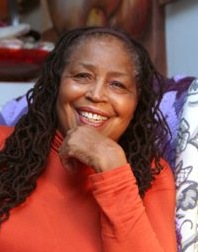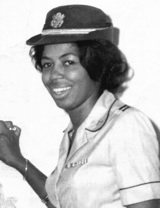The chief nurse tried to assign me to the 3rd Field Hospital, which was a ‘white uniform’ position, but I wanted the front line, to be wearing fatigues.”

The Marines at Khe Sanh did not take the first round during Tet; the 71st Evacuation Hospital located about 200 miles south, at Pleiku, home of the 4th Infantry Division and where I was stationed as an Army nurse, did. At midnight on Jan. 21, 1968, one of the hospital units took a direct hit from a 122mm rocket, which got imbedded in the floor and did not explode. The shelling went on for several hours. I was in the nurses’ quarters when the telephone rang. Everyone was screaming and no one wanted to answer it, but I knew the call was for me; I was the most seasoned in terms of combat injury. It was the chief nurse. “Captain Allen,” she said, “you have to go to your unit, it will be the only surgical unit open.” I asked if someone would come for me. “We have no one, “ she replied. “You have to go alone. Put on your flak jacket and your steel pot.” I had to walk outside in the dark. Nearly everything was on fire. When I got to my unit, 40 guys lay on the floor, some under mattresses, some bleeding. One of them looked up and said, “Captain is here.” The hospital did not have a combat contingent assigned at the time. I felt completely vulnerable knowing I could not defend us if the enemy broke through. Women were not allowed to have weapons. I was afraid that I would not be up to the task of taking care of these guys, but my training at St. Mary’s School of Nursing in Huntington, W.Va., kicked in. Everything I had prepared for came down to that moment.
God knows, when I was growing up, I didn’t want to be a nurse. Raised in Huntington by my grandmother since the age of 4, after my mother died from tuberculosis, I had my heart set on becoming a civil engineer. The Pennsylvania Turnpike was my inspiration; I pictured myself working outdoors, independently, building tunnels, bridges and roadways. My math teacher sent me to a white school; this was during the days of racial segregation and I was in the first group of African Americans to racially integrate public schools. But in my senior year of high school, I had to accept that engineering was not going to happen for me. I decided to pursue nursing school, which I could afford, and was determined to be the best nurse that I could be. I obtained by master’s degree in psychiatric nursing from Ohio State in 1966, but with the country embroiled in the civil rights movement, I really had no idea what I would do.
Coming from a family of warriors—a grandfather and an uncle had served, and both my brother were in the Navy, one of them in Vietnam—I realized I wanted to serve too. I knew about the absence of African Americans in professional health fields and the high number of African Americans in the war effort. So, I enlisted. On that day, I stepped onto “Walker’s Road,” as my grandfather referred to it, and never looked back. I still had to tell my grandmother, but I saved that until I was sworn in and was “Captain Allen, U.S. Army,” in January 1967, with a guaranteed assignment to Vietnam. Grandmama was scared but proud of me. Yes, I knew that there was a war going on over there, but there was a war going on here too.
After Officer Candidate School, I flew to Vietnam on Flying Tiger Airline with over 300 military personnel on board. I was one of eight women and the only African American. We arrived at Tan Son Nhut, frozen in silence, and had our first glimpse of the war zone; surrounding us was miles of barbed wire fencing and real tanks and APCs loaded with combat gear. Not often in America did it count being black, but there it did because there were a lot of black sergeants and they had never seen anybody like me in a war zone, so they were eager to talk to me. And there was a lot I wanted to know.

Well, out there on the base was a field of soldiers—there had to have been 500 sitting there, leaning on their duffel bags out under the hot, hot sun with no break. So, I stopped, because I always want to make sure that I know what I’m looking at. And I come from a psychiatric background so I sometimes see things different from other people. Finally, I asked the sergeant, “What’s going on?” He said they were replacements. So, now I really wanted to know, and then it hit me. I said, “Are you telling me they’re waiting for somebody else to die or get injured?” And he said, that’s it exactly. That’s a hard thing. These kids are like 18 or 19. I said, “How long do they sit?” They could be sitting for days, he said. I said, “Something’s wrong with this….waiting for someone to die so they could get a chance to die, too.” That was real hard for me.
The next day, since I was the ranking new officer, I got first choice of assignment. The chief nurse tried to assign me to the 3rd Field Hospital, which was a “white uniform” position, taking care of officers, but I wanted the front line, to be wearing fatigues. After much haggling, I took an assignment to the remote 12th Evacuation Hospital at Cu Chi, home of the 25th Infantry Division and the 25th Armored Cavalry. This base sat on top of the infamous “tunnels.” I, along with another nurse who wanted to be assigned with me, boarded a combat-loaded helicopter and flew into the war. As my eyes scanned the scene below, the African American door gunner, who just wanted to talk, pointed down to the jungle and said, “Captain, we got this shit called Orange that we spray, and within two days, this whole jungle is wiped out.” I had no idea what he was talking about but I was soon to find out. We arrived at Cu Chi on a Friday, and on Sunday we were mortared. Welcome to Vietnam.
I may have been prepared for the Army, but the 12th Evac was not ready for me, and everyone immediately let me know that I was not welcome. It was a very lonely place. Army regulations said that there could be no fraternization between ranks, and most African American troops were enlisted. So, from having nobody to talk with, to having the wrong kind of products to care for my hair and skin, I felt isolated and disregarded. And the constant stream of wounded Americans was a gruesome introduction to the realities of war.
I had my biggest scare when I found out one night that I was on call to “fly medevac.” I had never heard of such a thing. When I asked, “What do I do?” everyone told me, “You have a master’s degree; you’ll figure it out.” I got the call at 0200 hours, went out to the helipad and stood by myself in the dark. The helicopter arrived, hovered, with only a bottom light shining, and landed. Lying on the chopper’s floor was a young soldier with a chest wound. He was having trouble breathing. “Can I have a light?” I asked. “We fly without lights, at treetop level,” came the reply. But this kid belonged to someone; it was up to me to keep him alive. So I did mouth-to-mouth resuscitation until we dropped him off in Saigon.
I was assigned to the 71st Evac in September, four months prior to Tet. We knew a big battle was coming; we had been told by combat troops that we would be hit. They were aware of the buildup in the A Shau Valley. We were located in the Central Highlands and at the end of the Ho Chi Minh Trail. My greatest worry was the injured troops already in the hospital and what was to come. The night the attack started was beyond belief. The shelling came every night for about six weeks. The day the Chinooks brought in the body bags was almost too much for everybody. The injuries to troops were massive, and body bags stacked up. When medical staff came, they were new to this jungle and they were afraid. The physicians, especially the surgeons, were overwhelmed. How long can a person work with no relief especially when the human carnage is so great? Many days we would have 60-70 wounded soldiers and 40 beds. The workdays exceeded 12 hours. You worked until relief came. As the battles wore on, there were fewer casualties, but the magnitude of the injuries was just as great. There was very little food, medical supplies and even clothes to put on the injured until they could be moved out. And when choppers arrived with more body bags, it was enough to break the back of a really strong person. America would have been proud of us if they had taken the time to think of us. It seemed that all news from the States was bad.
In April 1968 I had a different kind of battle to fight: I did not want to return to the States, knowing I would be less accepted than I was when I left. I had applied for extensions, but every request was denied; women were allowed only one year in a war zone. Then during my final week, while on R&R in Hong Kong, the Rev. Martin Luther King was assassinated. The two African American soldiers who told me were in tears. How many deaths, how many injuries for freedom? In one week, I would be returning to Columbus, Ohio, my home of record. I was female, I was black, and now I was a war participant too.
It would not get any easier; I still ask, after years of being ignored as an officer and a veteran, will America ever accept and embrace the female warrior? Aretha Franklin says it better than anyone else: “All I ask is a little respect, when I get home…just a little respect.”
Oral history, published in February 2013 issue of Vietnam magazine. For more on Elizabeth Allen, in her own voice, listen to the interview she did with the Library of Congress’ Veterans History Project. Here’s the link to her interview http://lcweb2.loc.gov/diglib/vhp/story/loc.natlib.afc2001001.55266/




